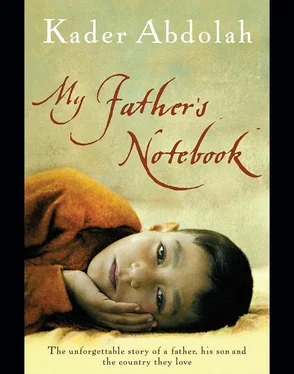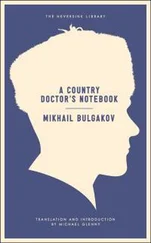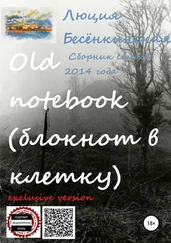Perhaps he said to Golden Bell, “Once you reach the cave, go into it as far as you can. Go all the way to the back until you can no longer stand. On your right you’ll see a ledge and on that ledge there will be bags of raisins and dates and dried fruits. Take those, along with the warm clothes and flashlights for mountain climbers in need, and go even farther into the cave. Go all the way back until you can crawl no longer. There you’ll be safe. Stay there for several days until the guards have stopped searching the mountains.”
In all likelihood these were the last few sentences in Akbar’s notebook.
He must have kissed Golden Bell goodbye. “Now go. You don’t have to worry about me. I’ll dig a hole in the snow and wait here until tomorrow. Then I’ll make my way back. It’s a good thing I’m here, because if the guards come, I’ll shout as loud as I can and you’ll know what’s going on. Have a safe journey, my child.”
Did Golden Bell and the other escaped prisoners ever reach the cave?
It’s entirely possible. Just as it’s possible that they slept in the cave’s recesses and never woke up again.
A hundred years from now, or maybe three hundred years from now, they will awaken, like the men of Kahaf, whose story is told in the Holy Book:
And so it went until the men of Kahaf finally sought refuge in the cave. “Grant us Thy mercy,” they said.
In that cave We covered their ears and their eyes for years.
And when the sun came up, the men saw it rise to the right of the cave. And when the sun went down, the men saw it set to the left, while they were in the space in between.
They thought they were awake, but they were asleep.
And We turned them to the right and to the left.
Some said, “There were three of them, and a fourth watched over them.”
Others, hazarding a guess, said, “There were five of them, and a sixth watched over them.”
And there were those who said, “There were seven of them.” No one knew.
We woke them, so that they might question one another.
One of them spoke: “We have been here for a day or part of a day.” Another said: “Allah alone knows how long we have been here. It would be best to send one of us to the city with this silver coin. We must be careful. If they find out who we are, they will stone us.”
Jemiliga then left the cave with the silver coin in the palm of his hand.
When he reached the city, he saw that everything had changed and that he did not understand the language.
They had slept in the cave for three hundred years and did not even know it. And some say there were nine more.
One day Golden Bell will wake up.
She will leave the cave with a silver coin in the palm of her hand.
And when she reaches the city, she will notice that everything has changed.
Allahu akbar. La ilaha illa Allah:God is great. There is no God but Allah.
ankahtu wa zawagtu:the words recited during the wedding ceremony that officially declare the couple to be man and wife.
Baba Taher:a mystic poet of the first half of the eleventh century. Every Persian can recite a few of his quatrains about love and death.
Eqra be-asme rabbeka alazi khalaqa … el-qalam:“Read! In the name of thy Lord and Cherisher, Who created, created man out of a mere clot of congealed blood…. He who taught the use of the pen.” This is the first sura of the Koran to be revealed to Muhammad. Gabriel brought it down to him from Heaven, and even though Muhammad was illiterate, Gabriel asked him to read the text. Once he had read it, Muhammad’s mission had officially begun.
Hafez:medieval Persian poet (1326–90), whose poetry is cited as a sacred text and learned by heart. No Persian household is complete without a volume of his poetry.
hekaya: ancient Persian stories.
ibn:son of.
jawid shah:long live the shah.
Jomah Mosque:The so-called Friday Mosque, one of the oldest mosques in Iran.
Kahaf: a well-known story in the Koran. A number of men who are being persecuted for their beliefs seek shelter in the kahf , or cave. Exhausted, they fall asleep. When they awake, they see that their hair and beards have aged. It seems they’ve slept for three hundred years.
Kazem Khan:Kazem is the name of one of Muhammad’s successors; a khan is a nobleman.
Khata: The Persian name for Northern China, the region from which Iran’s Mongol conquerors came. “Moon-faced,” or Mongolian, beauty became an archetype in Persian poetry. But the women of khata’ (with an almost identical pronunciation) are women of sin.
Khatun:Mrs.
Khayyam:Omar Khayyam (1048–1122) is known in the West mainly as the author of the Rubaiyat and numerous quatrains.
Lalehzar Mountain:named after the wild red tulips that grow on the mountain slopes.
Mahdi:the promised one.
Naqsh-e-Jahan Square:the oldest square in Iran.
Sa’di:medieval writer and poet (1213–93) whose hekayas represent the apogee of Persian language and literature. His book The Rose Garden can be found, like that of Hafez, in every Persian household.
Saffron Mountain:named after the red and yellow flowers that cover the mountainside in the autumn.
Sayyid:Sire, Mr (a term of address accorded to descendants of Muhammad).
Sheikh Lotfallah Mosque:one of the most beautiful mosques in Isfahan.
sigeh: under Shiite law, a man may have a maximum of four wives. In addition, he’s allowed an unlimited number of temporary wives, who make a marriage contract for a period ranging anywhere from one hour to 99 years. These sigeh have no inheritance rights.

The poems by J. C. Bloem and P. N. van Eyck have been translated for this edition by David McKay. The poet Jan Slauerhoff based his poem on the classic Chinese poem “Golden Bells” by Po Chu I. The Multatuli passage has been taken from Multatuli, Max Havelaar, translated by Roy Edwards, London: Penguin Books, 1987. The poem by Rutger Kopland, part of a series entitled “Suppose”, has been taken from Rutger Kopland, A World Beyond Myself , translated by James Brockway, London: Enitharmon Press: 1991.
TRANSLATOR’S NOTE: The passages from the Koran and Shiite prayer books are not reproductions of the actual Arabic texts but have been adapted by the author. They should, therefore, be regarded as retellings, or as snatches of texts remembered by the characters, rather than as direct quotations.
I wish to thank Diane Webb for her editorial advice and R. M. McGlinn for his assistance with the translation and transliteration of Farsi into English.













